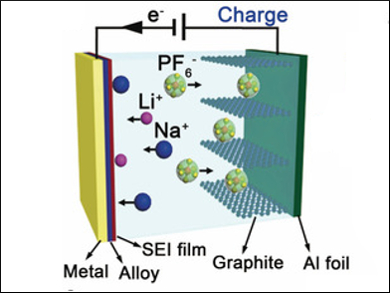The development of sodium-ion batteries (SIBs) is hindered by their low working voltages and poor rate and cycling performances. Overcoming these challenges could make SIBs promising for large‐scale energy storage, due to the low cost and natural abundance of sodium.
Yongbing Tang, Shenzhen Institutes of Advanced Technology, Chinese Academy of Sciences, and colleagues have developed a multi-ion strategy which uses a small amount of lithium ions to improve sodium-ion full batteries. In this design (pictured), expanded graphite and Sn foil were used as the cathode and anode, respectively. The system contains a hybrid electrolyte with Na+, Li+, and PF6– ions.
The batteries deliver a high working voltage of about 4.0 V, which is one of the best reported for sodium-ion full batteries, due to the high intercalation potential of PF6– anions. The team also achieved a good rate performance and a high cycling stability, with a capacity retention of 95 % over 500 cycles at 5 C. This was attributed to the reduced charge-transfer resistance and volume expansion provided by adding lithium ions. This work provides a strategy to enhance the electrochemical performance of SIBs.
- A Multi-Ion Strategy towards Rechargeable Sodium-Ion Full Batteries with High Working Voltage and Rate Capability,
Chunlei Jiang, Yue Fang, Wenyong Zhang, Xiaohe Song, Jihui Lang, Lei Shi, Yongbing Tang,
Angew. Chem. Int. Ed. 2018, 57, 16370–16374.
https://doi.org/10.1002/anie.201810575




